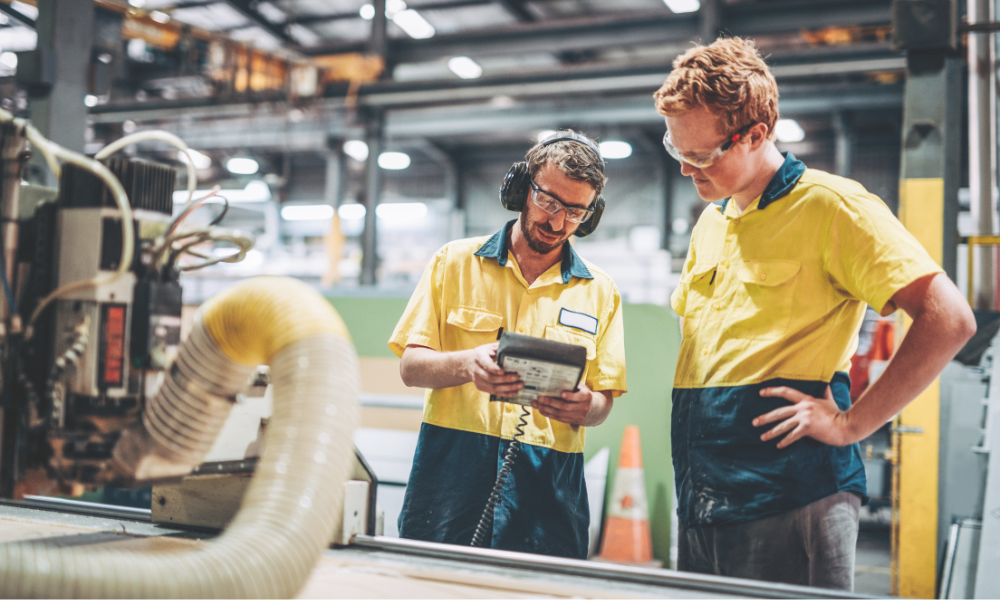What is warehouse automation? We answer that question (and more!) in the Ask EnviroStaff series.
Staffing at warehouses – a nonstop operation – has always been a challenge. This challenge was amplified by the COVID-19 pandemic, when employers across the supply chain needed workers on demand, particularly driven by e-commerce.
What is warehouse automation?
Automation driven by predictive algorithms, or not-too-far-over-the-horizon artificial intelligence, has helped alleviate some of the tight labor market. Automation (think computers, machines, or robots) also helps those working in warehouses do their jobs more efficiently. Plus, it can free their time for more productive work, to increase order accuracy, and improve safety.
While some employees may be afraid that robotics and automation will make their jobs obsolete, the ability to work in partnership with automated tools can be an incentive for employees. Even as the desire for automation grows, the Bureau of Labor Statistics estimates that employment rates in the warehousing sector will grow by around 7% in this decade compared to the previous decade.
In addition to labor shortages and rising costs, it will be especially important for companies to focus on how they manage their people and automation will play a significant role. According to a PwC study, up to 30% of all jobs could be automatable by the mid-2030s.
Automated warehouses will still need workers; some tasks are beyond the capacities of modern machines, and you always need someone behind the steering wheel overseeing operations. Automation isn’t eliminating jobs so much as creating new, more fulfilling positions while mitigating risks for workers.
This shift will present an opportunity for companies to focus on employee development and upskilling. As employees are increasingly asked to work with new technologies, it will be important for companies to provide new types of training and create more opportunities for employees to add value. Future employees will contribute to a more agile and innovative workforce.
Just as consumer demand for e-commerce and fast delivery is rising, the availability of warehouse workers – especially those with specific skills – is dwindling. In 2022, 73% of warehouse operators reported being unable to find enough labor to support demand, according to one study. Wages in the warehouse/transportation industry have grown as companies continued boosting pay to entice workers and fill gaps.
Insufficient fulfilment capacity is directly tied to lost sales and lost growth opportunity. A significant number of companies cited the tight labor market as a top threat to their business.
Warehouse automation helps brands keep pace; processing orders faster, more efficiently, and with greater accuracy. Automation isn’t taking jobs; it’s filling a void that is costing retailers significant sales and having a huge effect on the supply chain.
Interest in long-proven warehouse automation systems that pick/pack, sort, and carry packages throughout the facility is growing. There is also increasing investigation into how to integrate this automation into warehouse software systems, such as warehouse management and warehouse control systems (WCS), to extract more value from automation. Integrating these technologies into operations means trained coordination between workers, automated systems, and software to drive high-speed, high-volume warehouse execution.
An Automation Operations Support Manager, for example, is responsible for leading, maintaining, and improving warehouse automation reliability, system capability, and operational stability. They program and develop governance to address repetitive faults and improve asset utilization. Partnerships with engineering, project teams, site resources/maintenance, IT, finance and automation vendors will be critical skills to develop.
Now that you can answer the question, “what is warehouse automation?” you can get started on finding great candidates. With increased automation and a 24/7 fulfilment cycle, warehouse employers will need to adopt innovative staffing solutions such as direct hire or temp-to-hire to assist with hiring. EnviroStaff helps workers find their niche and employers fill their rosters in this fast-changing landscape. Contact the EnviroStaff team today to learn how we can fulfill your hiring needs.

